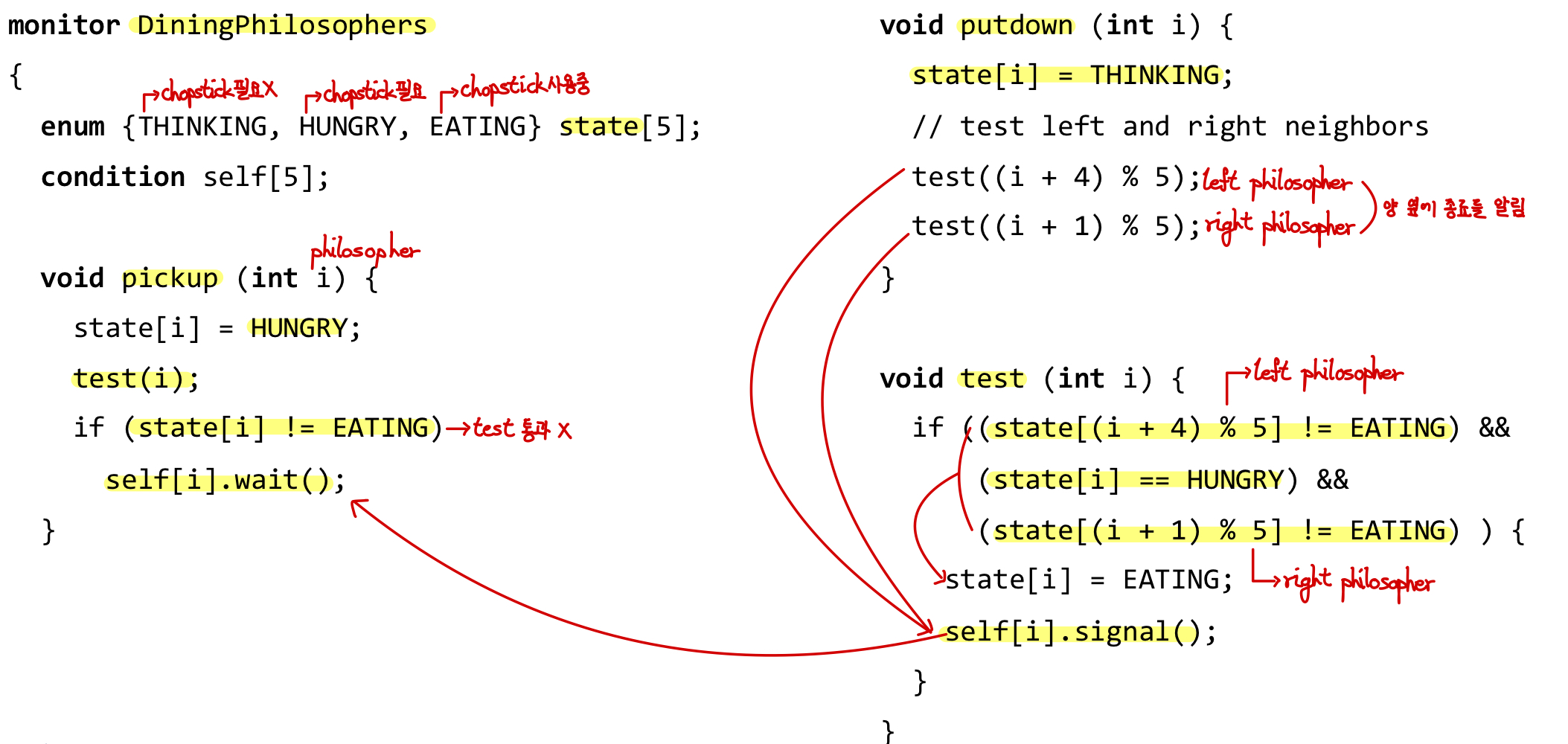| 일 | 월 | 화 | 수 | 목 | 금 | 토 |
|---|---|---|---|---|---|---|
| 1 | 2 | 3 | 4 | 5 | 6 | |
| 7 | 8 | 9 | 10 | 11 | 12 | 13 |
| 14 | 15 | 16 | 17 | 18 | 19 | 20 |
| 21 | 22 | 23 | 24 | 25 | 26 | 27 |
| 28 | 29 | 30 | 31 |
Tags
- OpenAI
- 머신러닝
- 티스토리챌린지
- PCA
- 딥러닝
- LLM
- 오블완
- AI
- 회귀
- 해커톤
- ChatGPT
- Classification
- 분류
- 지도학습
- LG Aimers 4th
- deep learning
- supervised learning
- LG
- LG Aimers
- regression
- gpt
- Machine Learning
- GPT-4
Archives
- Today
- Total
SYDev
[운영체제] Chapter 7. Synchronization Examples 본문
경희대학교 허선영 교수님의 운영체제 수업을 기반으로 정리한 글입니다.
Chapter Objectives
- bounded-buffer, readers-writers, and dining-philosophers synchronization problems에 대해 설명
- Linux, Windows에서 process synchronization problems를 해결하는 특정 tools에 대해 설명
- synchronization problems를 해결하기 위해 POSIX, Java가 어떻게 사용되는지 설명
- POSIX, Java API를 사용하여 process synchronization problems를 해결하는 solutions를 디자인하고 발전
Classic Problems of Synchronization
1. The Bounded-Buffer Problem

int n;
semaphore mutex = 1;
semaphore empty = n;
semaphore full = 0;- n 개의 buffers -> 각각 1개의 item 소유 가능
- mutex: buffer pool에 접근하기 위한 mutual exclusion
- empty & full: 비어있거나(empty buffer), item이 들어있는(full buffer) buffer의 개수를 나타냄
- 가장 처음 상태는 모두 비어있는 상태

-> Consumer에서 empty++하면, Producer는 wait(empty) line을 탈출
-> Producer에서 full++하면, Consumerㄴ느 wait(full) line을 탈출
2. Readers-Writers Problem
- concurrent processes에 의해 공유되는 database를 가정
- read 작업만 원하는 process -> reader
- update 작업을 원하는 process(read & write 모두 가능) -> writer
- writer가 database에 접근하는 동안, 다른 processes가 database에 simultaneous하게 접근하면 복잡한 문제가 발생 -> readers-writers problem
- 한 번에 하나의 wirter만 shared data에 접근 가능
- first readers-writers problem
- No reader is to be kept waiting unless a writer is writing
- writer가 write 작업을 진행하지 않는 한, reader는 기다리지 않는다.
- reader에게 우선순위를 부여, read 작업이 진행중이면 writer는 접근이 불가능
- starvation 문제 발생 가능 -> writers may starve
- second readers-writers problem
- Once a writer is ready to write, no "newly arrived reader" is allowed to read.
- writer가 준비 완료 -> newly reader 접근 불가
- writer에게 우선순위를 부여, write 작업이 진행중이면 reader는 접근이 불가능
- starvation 문제 발생 가능 -> readers may starve
- solution for first case
semaphore rw_mutex = 1;
semaphore mutex = 1;
int read_count = 0;- read_count: 현재 reader의 개수
- mutex: read_count 보호 -> mutual exclusion
- rw_mutex: read/write 결정

-> reader가 없어야 writer 접근 가능
- solution for starvation
- reader-writer locks를 제공하는 kernel
3. The Dining-Philosophers Problem

- 상황
- N 명의 philosophers, round table, bowel of rice in the middle
- thinking & eating state
- neighbors와 상호작용 X
- 한 번에 2개의 chopsticks를 가지려 시도 -> bowel of rice를 취하려면, 2개 모두 소유해야 함 & 완수했을 때 2개 모두 release
- in the case of 5 philosophers, shared data는 다음과 같음
- bowel of rice(data set)
- semaphore chopstick [5]: 1로 초기화된 상태
- The structure of Philosopher i:
while (true) {
wait (chopstick[i]);
wait (chopstick[(i + 1) % 5]);
/* eat for awhile */
signal (chopstick[i]);
signal (chopstick[(i + 1) % 5]);
/* think for awhile */
}- problem with this algorithm -> Deadlock


- 각 philosopher i는 operation pickup() & putdown()을 호출
DiningPhilosophers.pickup(i);
/** EAT **/
DiningPhilosophers.putdown(i);-> No Deadlock, but Starvation is possible -> philosopher의 eating 보장 X
Synchronization within the Kernel
- Linux와 Windows에서 제공되는 synchronization mechanisms 중 Linux에 대해 설명
1. Synchronization in Linux
- 2.6 이전의 버전 kernel에서는 short critical sections를 구현하기 위해 interrupts를 비활성화
- 2.6과 이후의 버전 -> fully preemptive
- Linux가 제공하는 것
- Semaphores
- Atomic integers
- Spinlocks
- Reader-writer versions of both
- On single CPU system, spinlocks -> kernel preemption을 활성/비활서오하하는 것으로 대체됨
- spinlocks -> lower overhead -> efficient context switching
- Atomic Variables
- atomic_t -> 원자 단위로 update(update 통째로)

-> atomic variable 전용 연산
POSIX Synchronization
- kernel developers만 사용할 수 있는 kernel과 다르게, user level에서도 사용 가능한 API 형태로 synchronization tools 사용
- mutex locks
- semaphores
- condition variable
- Unix, Linux, macOS에서 많이 씀
1. POSIX Mutex Locks
- Creating and Initializing the lock
#include <pthread.h>
pthread_mutext_t mutex;
/* create and initialize the mutex lock */
pthread_mutex_init(&mutex, NULL);- Acquiring and Releasing the lock
/* acquire the mutex lock */
pthread_mutex_lock(&mutex);
/* critical section */
/* release the mutex lock */
pthread_mutex_unlock(&mutex)
2. POSIX Semaphores
- named or unnamed
- named semaphores -> 이름을 붙임으로써, other processes와 공유 가능
- POSIX Named Semaphores
- creating an initializing the semaphore
#include <semaphore.h>
sem_t *sem;
/* Create the semaphore and initialize it to 1 */
sem = sem_open("SEM", O_CREAT, 0666, 1);- "SEM": 이름으로 semaphore 공유
- 1: 초기값에 따라 동작이 달라짐
- acquiring and releasing the semaphore
/* acquire the semaphore */
sem_wait(sem);
/* critical section */
/* release the semaphore */
sem_post(sem);- POSIX Unnamed Semaphores
- creating an initializing the semaphore
#include <semaphore.h>
sem_t sem;
/* create the semaphore and initialize it to 1 */
sem_init(&sem, 0, 1);- acquiring and releasing the semaphore
/* acquire the semaphore */
sem_wait(&sem);
/* critical section */
/* release the semaphore */
sem_post(&sem);
3. POSIX Condition Variables
- 6.7에서 소개한 condition variable과 동작이 비슷하지만, Pthreads에서는 monitor 제공 X
- locking mechanism to ensure data integrity
- C/C++에서는 monitor 제공 X
- POSIX condition variables are associated with a mutex lock to provide mutual exclusion
- Creating and Initializing the condition variable
pthreaed_mutex_t mutex;
pthread_cond_t cond_var; //condition variable -> 단독 사용 X(mutex와 함께 사용)
pthread_mutex_init(&mutex, NULL);
pthread_cond_init(&cond_var, NULL);- Threaed waiting for the condition a == b to become true
pthread_mutex_lock(&mutex);
while(a != b) {
pthread_cond_wait(&cond_var, &mutex); // cond_var, mutex 함께 사용
}
pthread_mutex_unlock(&mutex);- Thread signaling another thread waiting on the condition variable
pthread_mutex_lock(&mutex);
a = b;
pthread_cond_signal(&cond_var);
pthread_mutex_unlock(&mutex);728x90
반응형
'3학년 2학기 전공 > 운영체제' 카테고리의 다른 글
| [운영체제] Chapter 9. Main Memory (1) | 2024.11.21 |
|---|---|
| [운영체제] Chapter 8. Deadlocks (1) | 2024.11.19 |
| [운영체제] Chapter 6. Synchronization Tools (1) | 2024.11.03 |
| [운영체제] Exercise 2. Process Management (0) | 2024.10.10 |
| [운영체제] Chapter 5. CPU Scheduling (5) | 2024.10.09 |




